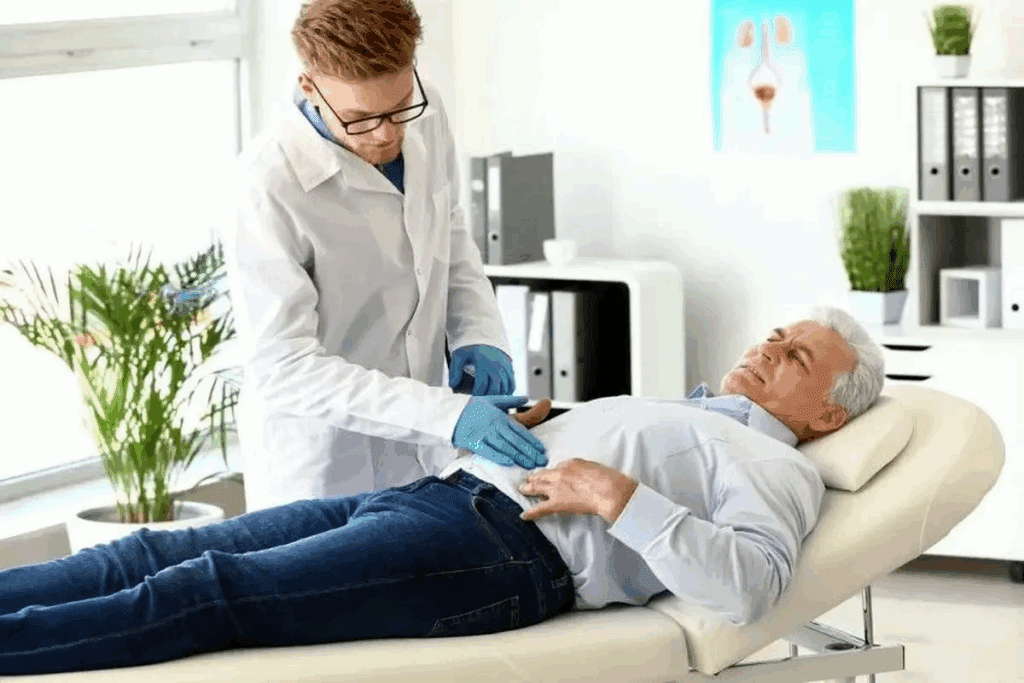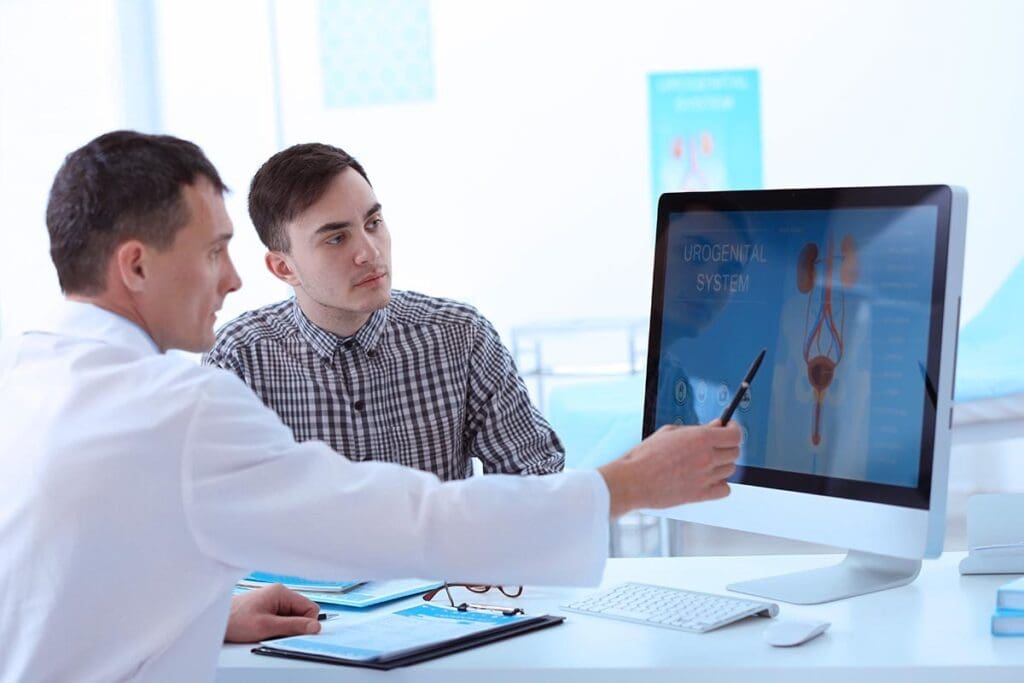Last Updated on November 25, 2025 by
When you first see a urologist, you might wonder what to expect. We’re here to help you understand the process. This way, you’ll get the best care for your urological needs.
A urologist is a doctor who focuses on the urinary and reproductive systems. At your first visit, we’ll take a detailed look at your medical history. We’ll also do a physical exam to get a clear picture of your symptoms and health.

This first step is key to diagnosing and treating your urological issues. By knowing your health history and symptoms, we can give you care that’s just right for you.
Urologists are key in healthcare, focusing on the urinary system in both men and women. They deal with many conditions. It’s important to know what urology is, what it covers, and when you might need a urologist.
Urology is a medical field that handles the urinary tract and the male reproductive system. Urologists treat issues like incontinence, erectile dysfunction, kidney stones, and urinary tract infections. They also do surgeries like vasectomies and prostate biopsies.
Recent guidelines show over 70% of urologists follow best practices. This ensures patients get the best care.

Many conditions need a visit to a urologist. These include:
If you have symptoms like painful urination, frequent urination, or blood in your urine, see a urologist. Men with erectile dysfunction or prostate health concerns should also seek care. Early treatment can greatly improve outcomes for many conditions.
The foundation of urological care starts with knowing your medical history. When you first see a prostate doctor or urologist, they will ask for your health history details.

Starting with your urinary symptoms is key. You’ll talk about what symptoms you have, how long they’ve lasted, and what makes them better or worse. This helps the urologist figure out what’s wrong and how to fix it.
It’s a good idea to write down your symptoms before you go. Include how often you pee, any pain, and if you leak urine. This info is important for finding the cause and deciding on treatment.
Your past health and current meds are also important. Tell your urologist about any surgeries, health issues, and meds you’re on, including supplements. This helps them understand your situation better and plan your treatment.
Before you see your urologist, list all your meds and supplements. Include how much you take and how often. This helps your urologist understand your health fully.
Family history is also key. Some urological issues run in families, so tell your urologist about any in your family. This helps them see if you might be at risk and plan your care better.
“Knowing your family history can give us insights into your urological health. It helps us spot risks and plan a better treatment,”
By getting all this info, your urologist can understand your condition better. This detailed approach is what makes a urological exam important for accurate diagnosis and treatment.
A urologist will do a physical exam to look for any health issues. They will check you thoroughly, focusing on what you need.
First, they check your overall health. They look at your blood pressure and do an abdominal exam. This helps find any problems related to your urological symptoms.
They also look for signs of other health issues that might be causing your urological problems. This helps them see the bigger picture of your health.
Men get special exams for their urological health. A key part is the Digital Rectal Exam (DRE). This involves a gloved finger checking the prostate gland for any issues.
They also check the outside of the genitals for any problems. This includes looking for testicular masses or epididymal tenderness.
Key components of a male urological examination include:
Women get exams focused on their urinary tract and related organs. They might do a pelvic exam to check for issues like pelvic organ prolapse. This can cause urinary incontinence or other symptoms.
They also look for signs of urinary tract infections or other conditions. Their goal is to fully understand your urological health.
Urologists use various tests during the first visit to diagnose urological conditions. These tests help understand the patient’s condition and decide on treatment.
Urinalysis is key in urology, spotting issues in the urine. It finds bacteria, white blood cells, blood, and nitrates. These signs point to infections or urinary tract problems.
“Urinalysis is a simple yet powerful test that provides valuable insights into a patient’s urological health,” it helps diagnose UTIs, kidney stones, and more.
Blood tests are vital, mainly for men. The Prostate-Specific Antigen (PSA) test checks for prostate cancer. High PSA levels might mean cancer, but it’s not the only cause.
It’s important to talk to your urologist about PSA screening. This helps you understand its benefits and limits.
Imaging studies might be done at the first visit to look deeper into symptoms. Ultrasound, CT scans, or MRI scans show detailed images of the urinary tract. They help find conditions like kidney stones or tumors.
More than 70% of urologists follow guidelines for the first evaluation. This includes urinalysis and PSA testing, showing their key role in urology.
Urological care can differ a lot based on where you are and who your doctor is. It’s key to know these differences and how they affect your care.
Urological practices vary a lot. They can be shaped by local healthcare rules, the doctor’s training, and the tools they have. For example, a doctor in a small town might do things differently from one in a big city because of equipment access.
First visits to a urologist usually include basic tests like urinalysis and a medical history. But some tests might be suggested based on your health or risk factors.
Standard assessments typically include:
Optional assessments might involve:
At Liv Hospital, we aim to provide top-notch urological care. We focus on the patient and follow strict standards. Our goal is to meet global medical excellence by sticking to the latest research and best practices.
We make sure the first check-up is thorough. It includes a detailed medical history, physical exam, and the right tests. This way, every patient gets the same high-quality care, no matter who their doctor is or where they are in our network.
After your first visit to a urologist, you’ll get a detailed check-up to find out what’s causing your symptoms. It’s important to know what urologists do to tackle urinary and genital health problems.
The urologist will talk about your diagnosis and what treatments you might need. This could be medicine, physical therapy, or surgery. Knowing about urology and the role of a prostate doctor helps you make smart choices about your health.
Places like Liv Hospital focus on top-notch urology care. We aim to give you all the support and advice you need during your treatment.
By understanding what comes next after your first visit, you can help manage your health better. This way, you can get the best results possible.
A urologist is a doctor who deals with the urinary tract and male reproductive system. They treat issues like kidney stones and prostate problems.
Urology is a medical field that studies and treats urinary and reproductive system disorders. It includes infections, kidney disease, and prostate cancer.
At your first visit, the urologist will take your medical history and do a physical exam. They might also order tests like urinalysis or imaging studies.
A urologist checks ejaculation to evaluate male reproductive health. This includes a medical history, physical exam, and sometimes diagnostic tests.
A digital rectal exam (DRE) checks the prostate gland. It’s done to find abnormalities that could mean prostate issues, like cancer.
Common tests include urinalysis for infections and blood tests for health checks. Imaging studies like ultrasound or CT scans are also used.
Yes, urological practices and protocols can vary. They depend on the doctor’s specialty, location, and the healthcare facility’s guidelines.
Liv Hospital focuses on quality, patient-centered care. Our urologists use the latest diagnostic and treatment technologies for the best results.
After your first visit, your urologist will discuss your diagnosis and treatment options. You might need more tests, start treatment, or schedule a follow-up.
Subscribe to our e-newsletter to stay informed about the latest innovations in the world of health and exclusive offers!